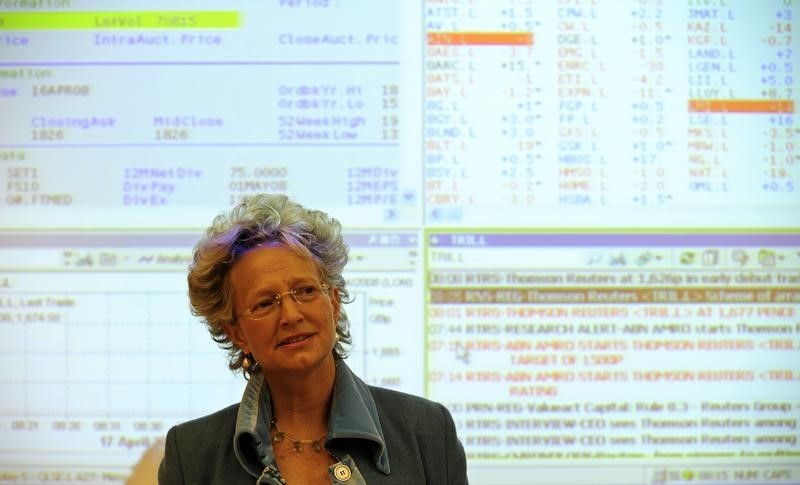By Andrew MacAskill and Huw Jones
LONDON (Reuters) - HSBC (L:HSBA), Europe's biggest bank, has appointed Clara Furse, a former chief executive of the London Stock Exchange (L:LSE), to chair its ring-fenced UK retail business.
Furse stepped down from her role as a member of the Bank of England's Financial Policy Committee on Tuesday in order to take the job at HSBC, where she will oversee its British retail banking and wealth management, commercial banking and global private banking operations.
"We are thrilled to have secured Clara as chairman of the HSBC UK board," Group Chairman Douglas Flint said in a statement. "She brings unrivalled knowledge of the UK's financial markets, systems and regulatory architecture."
Furse faces a three-month cooling-off period after leaving the BoE before she can start at HSBC. Her role on the FPC involved setting the regulatory framework for British banks.
Britain's ring-fencing rules aim to avoid a repeat of the 2008 financial crisis, when banks' bad bets in wholesale financial markets put ordinary depositors' cash at risk, and led to big taxpayer-funded bailouts.
The rules apply to all banks in Britain that have both retail and commercial or investment banking activities.HSBC's ring-fenced bank will be headquartered in Birmingham from 2018, a year before the separation of the business has to take place.
Furse struggled initially to convince UK lawmakers that she was suitable as a member of the FPC, a new watchdog launched in 2013 which at the time needed to muster credibility quickly.
After an awkward session before parliament's Treasury Select Committee, lawmakers said they had "serious concerns" about Furse's appointment to the new watchdog.
This they said related to her lack of awareness about the importance of asserting the FPC's independence, and her role as a non-executive director at Fortis, the Belgian bank that had to be bailed out in the financial crisis.
On her reappointment to the FPC, lawmakers said in March this year that some of her responses to their questions "were a source of concern", and that she made no reference to potential risks from Brexit in her written evidence.
In a statement released by the BoE, Furse said she would miss the FPC's "intense and important deliberations", but wanted to play "a more active and direct role in supporting the UK’s economic ambitions at a time of great change".
Furse also made it clear in March that she believed there should be no rush to force banks to hold more capital because she worried that an increase in the requirement could choke off more lending.
The FPC went ahead with implementing a gradual rise in capital requirements, a policy which was then scrapped in the light of the June referendum vote to leave the European Union.
When Furse, a former derivatives trader, headed the London Stock Exchange she lost out in 2001 to Paris-based Euronext (PA:ENX) in a fierce battle to acquire London's LIFFE derivatives exchange, despite making a higher bid.

Failing to acquire LIFFE left the LSE vulnerable and led to Furse fighting off a series of takeover bids before stepping down in 2009. She was succeeded by Xavier Rolet, who negotiated this year's deal to merge the LSE with Deutsche Boerse (DE:DB1Gn).